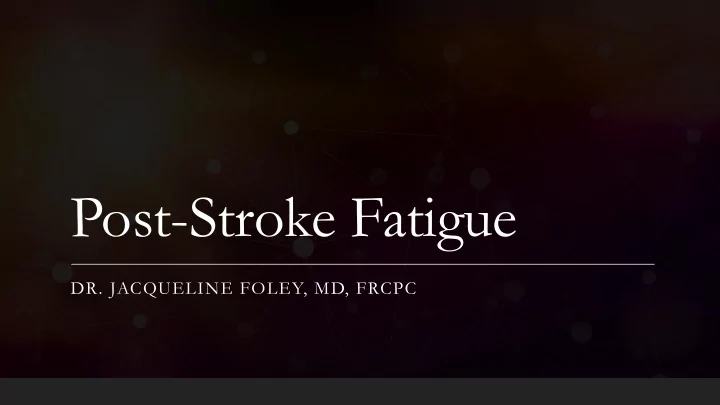

Post-Stroke Fatigue DR. JACQUELINE FOLEY, MD, FRCPC
Post-Stroke Fatigue -Fatigue is a common and often debilitating sequela of both hemorrhagic and ischemic stroke -Globally there are 33 million stroke survivors and at least 1/2 experience post- stroke fatigue
Post-Stroke Fatigue - Common -At least half of all stroke survivors experience fatigue. -Post-stroke fatigue can be experienced following a stroke at any point during the recovery process.
Post-Stroke Fatigue Definition: “Subjective lack of physical and/or mental energy that is perceived by the individual or caregiver to interfere with usual and desired activities”
Post-Stroke Fatigue Definitions: “A feeling of early exhaustion developing during mental activity, with weariness, lack of energy and aversion to effort.” “Sense of exhaustion, lack of perceived energy or tiredness, distinct from sadness or weakness.”
Post-Stroke Fatigue Decreased More difficulty Negative impact on participation in resuming social, daily activities physical activities and family and rehabilitation professional activities
Post-Stroke Fatigue There is a consensus among clinicians, researchers, patients, and caregivers that post-stroke fatigue is very important because it affects Quality of Life.
Pathophysiology of Post-Stroke Fatigue Changes to cortical excitability
- “low excitability of both corticospinal output and its facilitatory synaptic inputs from cortical and subcortical sites” -little convincing evidence that links Pathophysiology post-stroke fatigue with one specific of Post-stroke lesion location fatigue -impaired motor control seems to be predictive of post-stroke fatigue
Pathophysiology of Post-stroke fatigue Other possible causes that have been explored include: -Inflammation -Immune response -Biochemicals such as glutamate -Genes (in particular genes that modulate inflammation and increase pro-inflammatory cytokines)
When patients ask why am I now so tired? -your brain is working harder to process information -your brain runs out of fuel or energy quicker than it did prior to the stroke -You are experiencing a decreased ability of the central nervous system to communicate with the muscles of your body and produce the necessary chemicals (neurotransmitters) in the brain to process information
The multidimensional aspects of post – stroke fatigue
1. Demographic Factors 2. Neurological/physical deficits Multidimensional 3. Medical co-morbidities 4. Medications 5. Sleep disturbances
6. Pain 7. Pre-stroke fatigue Multidimensional 8. Depression and anxiety 9. Cognitive impairment
Managing Fatigue
The Energy Bank - Think about your body’s energy stores as money in a bank account. -You make deposits and withdrawals based on a budget so that you have enough energy for all your daily activities. -If you empty your bank account of energy you will not have enough to do all that you need in a day. (Morio, OT, GF Strong Rehab Centre)
Improve Sleep
Improve Sleep 1. Keep the same bedtime and wakeup time, even on the weekends 2. Avoid alcohol 3. No evening caffeine 4. Relaxing routine before bedtime 5. Avoid using your phone, computer, watching your television before bedtime 6. Minimum 20 minutes of daylight every day
Physical activity -Regular exercise improves cardiovascular health and improves your body’s ability to use oxygen efficiently to perform your daily tasks -Exercise increases your strength and energy reserves -Positive impact on mood, sleep and cognition
Consider the 5 Ps 1. Pacing 2. Prioritizing 3. Planning 4. Positioning 5. Prevention
Pacing -A common error is to deny your fatigue and carry on as usual -Better to set a new pace that allows for more rest breaks or relaxation time -Rest before you are fatigued -Alternate your activities, change from a strenuous task to a lighter one
Prioritizing -Balance -Decide what is most important to you, somewhat important and least important -Allow people to help - Decide what tasks could be eliminated and ask yourself “Is this really necessary?”
Planning - Just as you budget enough money to make sure you don’t overspend; you must plan to budget your energy for the activities you need to do -Keep your energy bank as full as possible -Make time to fill your energy reserves - Say ‘no’ without feeling guilty Spread heavier tasks out over the week, do harder activities when you feel your best
Positioning -Environment and how you sit/stand is important to think about -Use good posture -Sit for tasks as needed, e.g. washing, dressing, preparing ingredients for cooking, folding clothes -Avoid awkward postures and practice proper lifting techniques -Make sure your work area is the correct height and your body is supported -Use tools to make tasks easier (ie. Food processor, microwave) -Stretch breaks every 15 minutes
Prevention - Listen to your body’s natural call for a rest and do not feel guilty if you need to take a rest. - Try to work in quiet surroundings and minimize the amount of “white noise” -Go shopping when it is least busy -If you are a driver, avoid driving in rush hour
Pharmacologic Intervention As a result of the multifaceted nature of No one medication has post-stroke fatigue, the been found to cure post- pharmacological stroke fatigue management is far from satisfactory
Pharmacologic Interventions Some medications that have been looked at: *Modafinal (possibly better in those who have experienced a brainstem stroke). More research is needed to fully understand the benefits of this treatment. *Vitamin supplementation: (the data is insufficient to draw firm conclusions) but possibly some benefit with Vit B1, Vit B12, idebenone (a synthetic coenzyme Q10 analogue).
Cognitive *Some patients have found cognitive behavioural therapy can help manage fatigue by increasing a Behavioural person’s understanding of their experience of Therapy fatigue, triggers and ability to respond.
Find ways to replenish your “energy bank” -Breathing and relaxation techniques -Meditation -Listening to calming music -Mindfulness Based Stress Reduction (MBSR): a group program that focuses upon the progressive acquisition of mindful awareness, of mindfulness. Typically an eight week program that teaches about mindfulness meditation, body scanning and simple yoga postures. [Evidence level B]
Concluding remarks and Questions -
Recommend
More recommend